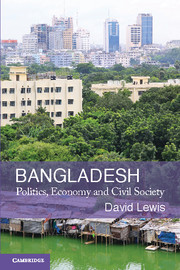Book contents
- Frontmatter
- Contents
- Maps
- Abbreviations
- Acknowledgements
- 1 Introduction
- 2 A State in the Making
- 3 Towards Bangladesh
- 4 State, Politics and Institutions
- 5 Nongovernmental Actors and Civil Society
- 6 Economic Development and Transformation
- 7 Population, Natural Resources and Environment
- 8 Conclusion
- Glossary of Bengali Terms
- Bibliography
- Index
6 - Economic Development and Transformation
Published online by Cambridge University Press: 05 June 2012
- Frontmatter
- Contents
- Maps
- Abbreviations
- Acknowledgements
- 1 Introduction
- 2 A State in the Making
- 3 Towards Bangladesh
- 4 State, Politics and Institutions
- 5 Nongovernmental Actors and Civil Society
- 6 Economic Development and Transformation
- 7 Population, Natural Resources and Environment
- 8 Conclusion
- Glossary of Bengali Terms
- Bibliography
- Index
Summary
Bangladesh's economy has changed considerably since Liberation. In terms of production and trade, it has seen the rise of nontraditional industrial exports such as the ready-made garment sector and the growth of intensive irrigation-led agriculture. There has been a significant, albeit gradual, shift in economic governance from 1970s-style centralised state planning towards a partially “liberalised” economy with a greater level of integration with the rest of the world. Although the economy had remained heavily dependent on international aid during the 1970s and 1980s, by the 1990s its centrality had become displaced by export earnings from the ready-made garment sector and the rise of remittances from Bangladeshis living and working overseas, particularly in the Gulf States. The garment industry brought important changes in the gender composition of the formal-sector labour force. Investment in infrastructure has helped to facilitate economic growth, but continuing political instability has periodically limited wider economic progress and change, while volatility in international markets has brought increased risk to the economy.
Since the early 1990s, Bangladesh's economic performance has improved in terms of economic growth and gains in poverty reduction. World Bank figures show a jump in GDP growth from an annual average of 3.7 percent during the 1980s to one of 5.2 percent during the second half of the 1990s. Export earnings have increased steadily, from 7 percent of the GDP in 1991 to 18 percent in 2006 (Murshid et al. 2009). However, the economic transformation that has followed from the liberalisation reforms has come at a cost. Despite positive impacts of income growth on poverty, there is a worsening pattern of income distribution. Although most economic change has generally centred on the urban formal sector and the rural nonfarm sector, there has been little impact on the broader farm or urban informal sectors. There are low levels of tax-revenue collection and local resource mobilisation and extensive money laundering for political purposes. As a result, Bangladesh faces the future with an economy that has increasingly globalised elements but also with a large rural sector that remains in place, an extensive “informal sector” and high levels of corruption.
- Type
- Chapter
- Information
- BangladeshPolitics, Economy and Civil Society, pp. 136 - 166Publisher: Cambridge University PressPrint publication year: 2011



